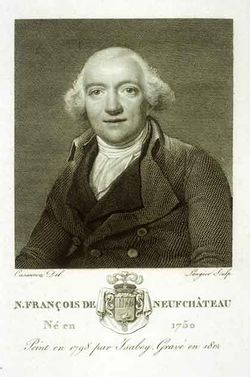فرانسو دى نوفشاتو

نيكولا-لوي فرانسوا دى نوفشاتو (Nicolas-Louis François de Neufchâteau ؛ النطق الفرنسي: [fʁɑ̃swa də nœfʃato]؛ 17 أبريل 1750 – 10 يناير 1828) كان رجل دولة فرنسي وشاعر وعالم.
سيرته
النشأة
Born at Saffais, in Meurthe-et-Moselle, the son of a schoolteacher, he studied at the Jesuit college of Neufchâteau in the Vosges, and at the age of fourteen published a volume of poetry which obtained the interest of Jean-Jacques Rousseau and of Voltaire. Neufchâteau conferred on him its name, and he was elected member of some of the main academies of France. In 1783 he was named procureur-général to the council of Saint Domingue. He had previously been engaged on a translation of Ariosto, which he finished before his return to France five years afterwards, but it was destroyed during the shipwreck which occurred during his voyage home.[1]
الثورة
After the French Revolution, Neufchâteau was elected deputy supplant to the National Assembly, charged with the organization of the département of the Vosges, and elected later to the Legislative Assembly, of which he first became secretary and then president. في 1793 he was imprisoned on account of his supposed political sentiments, as they were deduced from his drama Paméla ou la vertu récompensée (Théâtre de la Nation, 1 August 1793), but was set free a few days afterwards with the start of the Thermidorian Reaction.[1]
الديركتوار وناپليون
في 1797, he became Minister of the Interior, distinguishing himself by his thorough administration. It is Neufchâteau who initiated the French system of inland navigation. He inaugurated the museum of the Louvre and was one of the promoters of the Exposition des produits de l'industrie française, the first universal exhibition of industrial products.[1] He replaced Lazare Carnot as a member of the French Directory, a position he held between 8 September 1797, and 20 May 1798.[citation needed]
From 1804 to 1806 he was president of the Sénat conservateur, coinciding with the establishment of the First Empire – his office implied that he was the one to solicit Napoleon Bonaparte to assume the title of Emperor. In 1803, he was admitted to the Académie française, and in 1808 he received the dignity of count. Retiring from public life in 1814, after the Bourbon Restoration, he occupied himself chiefly with the study of agriculture until his death.[1]
أعماله
Neufchâteau had multiple accomplishments, and interested himself in a great variety of subjects, but his fame rests mostly on what he did as a statesman for the encouragement and development of the industries of France. His late poetical productions are not judged to be as original as his youth oeuvre. He was a noted grammarian and literary critic, as is witnessed by his editions of the Lettres provinciales and Pensées of Blaise Pascal (Paris, 1822 and 1826) and Alain-René Lesage's Gil Blas (Paris, 1820). He was also the author of a large number of works on agriculture.[1]
ببليوگرافيا
- Poésies diverses (1765)
- Ode sur les parlements (1771)
- Nouveaux Contes moraux (1781)
- Les Vosges (1796)
- Fables et contes (1814)
- Les Tropes, ou les figures de mots (1817)
انظر أيضاً
الهامش
مراجع
- Recueil des lettres, circulaires, discours et autres actes publics émanés du duc François pendant ses deux exercices du ministère de l'Intérieur (Paris, An. vii.-viii., 2 vols)
- H. Bonnelier, Mémoires sur François de Neufchâteau (Paris, 1829)
- J. Lamoureux, Notice historique et littéraire sur la vie et les écrits de François de Neufchâteau (Paris, 1843)
- E. Meaume, Étude historique et biographique sur les Lorrains révolutionnaires: Palissot, Grégoire, François de Neufchâteau (Nancy, 1882)
- A. F. de Sillery, Notice biographique sur M. le comte François de Neufchâteau (1828)
- Ch. Simian, François de Neufchâteau et les expositions (Paris, 1889)
وصلات خارجية
- أعمال من Nicolas Louis François de Neufchâteau في مشروع گوتنبرگ
- Works by or about فرانسو دى نوفشاتو at Internet Archive
| مناصب سياسية | ||
|---|---|---|
| سبقه Pierre Bénézech |
وزير الداخلية 16 July 1797 – 14 September 1797 |
تبعه François Sébastien Letourneux |
| سبقه François Sébastien Letourneux |
وزير الداخلية 17 June 1798 – 22 June 1799 |
تبعه Nicolas Marie Quinette |
| مناصب أكاديمية | ||
| سبقه Pierre-Antoine Lebrun |
المقعد رقم 2 الأكاديمية الفرنسية 1816–1827 |
تبعه Aimar-Charles-Marie de Nicolaï |
- Articles with unsourced statements from August 2017
- Pages with empty portal template
- Articles containing فرنسية-language text
- مواليد 1750
- وفيات 1828
- People from Meurthe-et-Moselle
- مديرو الجمهورية الفرنسية الأولى
- كتاب تراجم فرنسيون
- 18th-century French dramatists and playwrights
- 19th-century French dramatists and playwrights
- اقتصاديون فرنسيون
- كتاب مقالات فرنسيون
- وزراء داخلية فرنسيون
- محامون فرنسيون
- نقاد أدبيون فرنسيون
- شعراء فرنسيون
- مترجمون فرنسيون
- أعضاء الأكاديمية الفرنسية
- Counts of the First French Empire
- مهندسون زراعيون فرنسيون
- ضباط عظام في جوقة الشرف
- مدفونون في مقبرة پير لاشيز
- Male essayists
- French male poets
- كتاب مقالات القرن 19
- كتاب القرن 19